Gaza: UN Egypt fully mobilized as Egypt stands at forefront of humanitarian effort
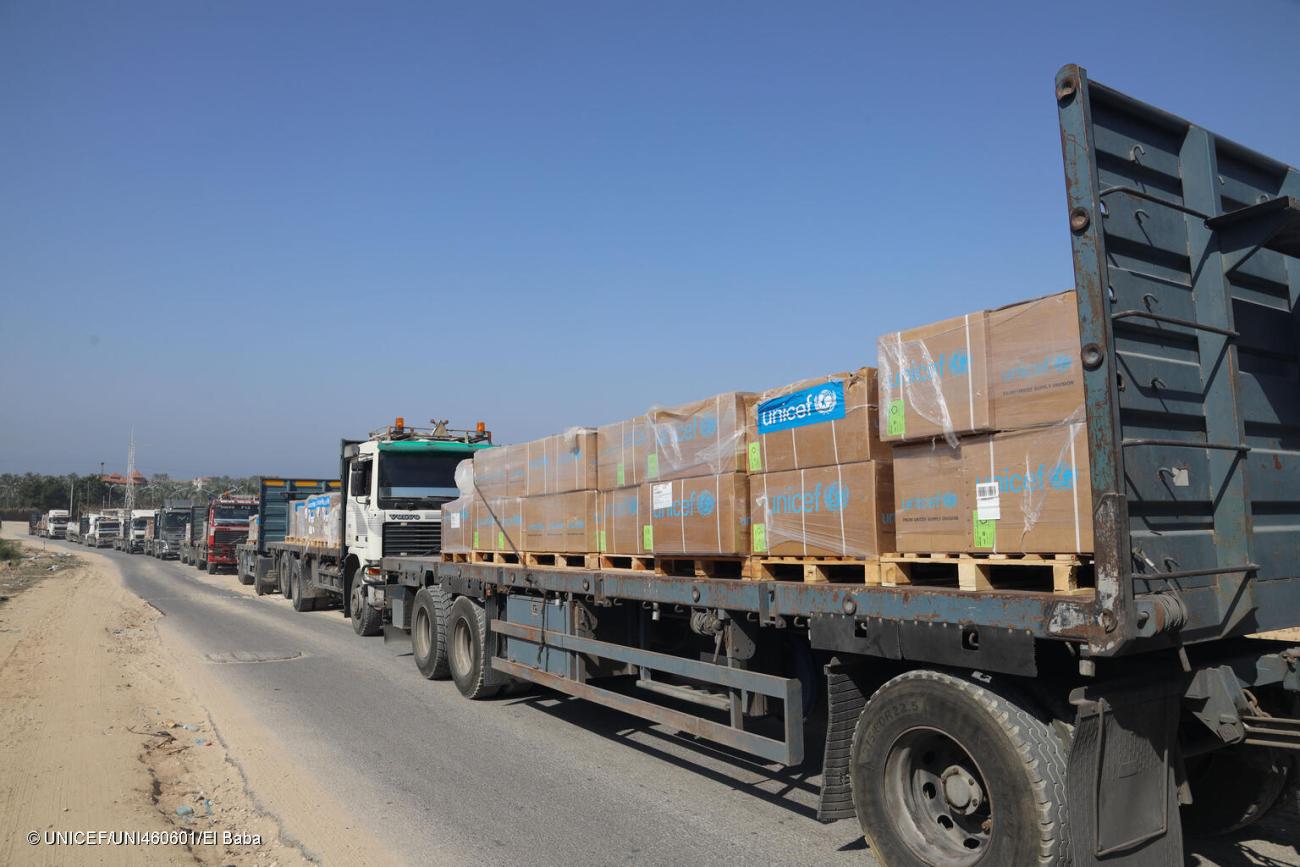
The United Nations (UN) system in Egypt has joined forces with the Egyptian government to deliver crucial aid to those in desperate need in Gaza.
In a robust response to the severe humanitarian crisis unfolding in Gaza, Egypt has designated North Sinai's El-Arish International Airport as the hub for humanitarian supplies arriving from around the world. The Egyptian Red Crescent Society coordinates the humanitarian aid in El-Arish and manages its delivery into Gaza via the Rafah border crossing.
The United Nations (UN) system in Egypt has joined forces with the Egyptian government to deliver crucial aid to those in desperate need in Gaza. The collaborative effort, focused on utilizing Rafah as a lifeline for 2.2 million Palestinians, marks a significant step towards addressing the dire situation.
Preparations by the UN in Egypt were underway even before aid was allowed into Gaza on October 21, for the first time since the outbreak of hostilities. In a collective UN system response, overseen by UN Resident Coordinator Elena Panova, the UN country team is working hand in hand with the Egyptian Red Crescent Society and other Egyptian institutions to accelerate the delivery of assistance to the people of Gaza.
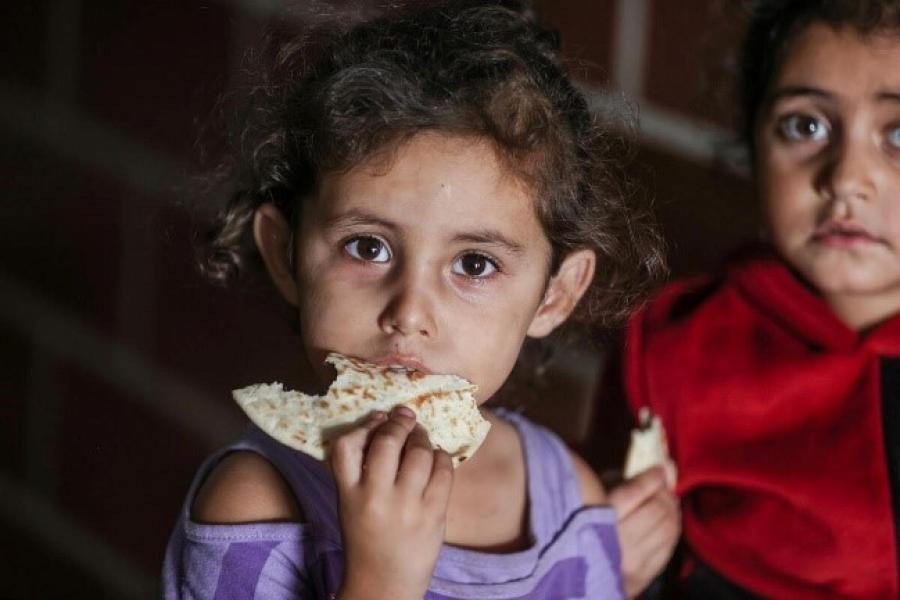
US$1.2 billion needed to support people in the Occupied Palestinian Territories
Earlier in November, the United Nations and its partners issued Flash Appeal for scaling up humanitarian operations in support of 2.2 million people in the Gaza Strip and 500,000 of the most vulnerable inhabitants of the West Bank.
According to the Flash Appeal, at least US$1.2 billion is required to deliver existing humanitarian services amid ongoing hostilities. According to OCHA, only 20.9 per cent of that amount has been mobilized, while more than 80 per cent of the population is in dire need of humanitarian assistance.
The UN would like to express its gratitude to donors who provided generous support to the Flash Appeal for the Occupied Palestinian Territory 2023 and to those who gave in-kind assistance to Gaza through the Egyptian Red Crescent Society.
Egypt at the forefront of humanitarian and diplomatic efforts
Since the outbreak of the Gaza crisis, the government of Egypt has been at the forefront of lifesaving efforts, with the Rafah crossing and El-Arish airport serving as centers of hope to alleviate the suffering.
“As the UN in Egypt, we have been working with relevant authorities in Egypt and the Egyptian Red Crescent Society to facilitate an efficient and needs-based logistics system to allow for humanitarian assistance to reach Gaza,” UN Resident Coordinator Elena Panova said.
“Let me highlight that what we do on the Egyptian side of the border, in assisting to put in place a humanitarian lifeline to Gaza, we do so thanks to the efforts of the Government of Egypt, and under the leadership of the Egyptian Red Crescent Society,” she added.

Ms. Panova noted that the Egyptian authorities have enabled a technical team of UN experts to temporarily support the Egyptian Red Crescent Society in El-Arish in an advisory and consultative capacity. “From our side, working with colleagues in the Occupied Palestinian Territory, we aim to ensure that what gets in speaks to what is most needed in Gaza at that point in time,” she said.
Below is an overview of key responses by the UN in Egypt, with a special focus on assistance that has been moved across the border since October 21.
Multi-layer support to Egyptian Health System and Services
The World Health Organization (WHO) provided essential supplies from its Dubai logistics hub, via 14 trucks through Rafah crossing to Gaza. These included trauma supplies for 3,500 injured individuals, medication for 151,500 people with Non-communicable Diseases (NCDs), 235 portable trauma bags, essential health supplies for 400,000 people, and enough trauma essentials to support 800 surgeries.
Moreover, WHO Egypt has supported the Egyptian Council for Tribes and Families in procurement of essential needs for children, women, and elderly people, including wheelchairs, personal sanitary and hygiene items, for almost US$23,000.
WHO Egypt contributed to supporting blood donation campaigns by providing 1,600 cooling packs and 200 foam cooling boxes worth almost US$16,000 to the National Blood Transfusion Service/MOHP to have the capacity to transfer the blood products to Gaza.
WHO has also provided the North Sinai Health Directorate with environmental equipment and supplies, and Water, Sanitation and Hygiene (WASH) essentials, including 10,000 liters of detergents and disinfectants, as well as 10,000 hygiene kits. These supplies are intended to support the National Humanitarian Response and provide medical care for injured people who have crossed through Rafah from Gaza, with a total cost of almost US$113,000.
In addition, WHO Egypt has supported the curative sector and the Ministry of Health with anesthesia drugs, worth almost US$11,000, for 1,000 patients among the medical evacuees.
To strengthen the referral hospitals, within the medical evacuation pathway of injured people from Gaza, WHO Egypt supported the Ministry of Health by providing trauma kits and orthopedics essentials. These items are meant for 1,000 patients, with a budget of US$580,000.
Also, responding to a Ministry of Health request, WHO Egypt procured a CT scan and 2 C-Arms to support the referral hospitals within the medical evacuation pathway of injured people from Gaza, with an estimated budget of US$400,000. These items are critical to save the lives of seriously injured people with fractures and cardiac respiratory problems.
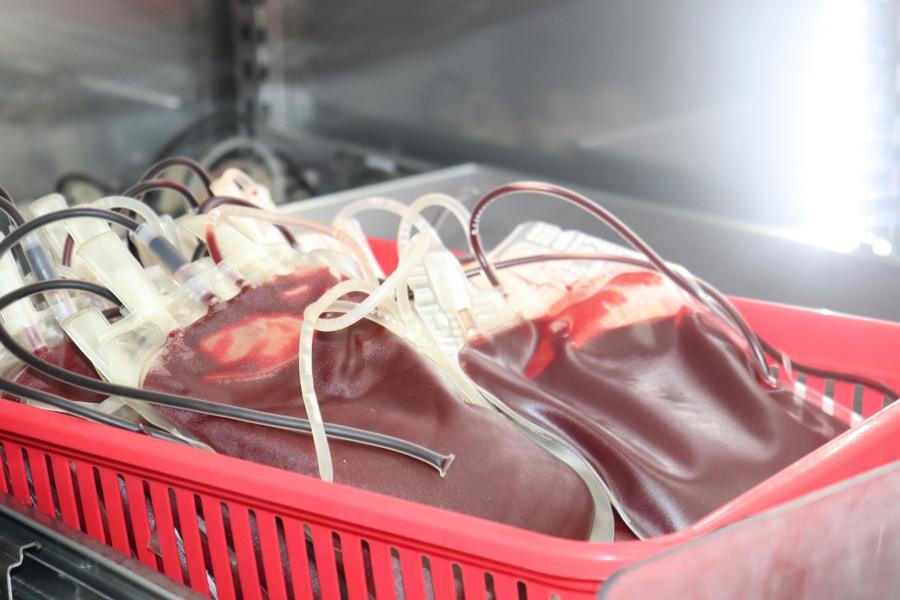
And to support the Egyptian Red Crescent Society’s logistics and operations during the Gaza crisis, WHO Egypt procured two vehicles with cold chain capabilities with total cost of US$78,000. This aims to ensure the effective transportation and storage of critical supplies, maintaining the integrity of the cold chain throughout the distribution process.
Capacity building of Healthcare Providers
As part of the response to the medical evacuation of injured people from Gaza, WHO Egypt is conducting a series of training courses covering different topics to enhance the knowledge and skills of the Healthcare Providers (HCPs), including:
- Mental health and psycho-social support (MHPSS) training covering psychological first aid and trauma focused psychotherapy, for 15 psychologists and 20 psychiatrists.
- A Basic Emergency Course for 125 health care providers, mainly nurses and physicians from different entities. The course includes managing injured and acutely ill individuals from the medical evacuees in Egypt and has a large practical component which also includes conflict-related injuries including burns and blast injuries.
Emergency response with high volumes of supplies
Since the start of the crisis, UNICEF has acted swiftly to procure lifesaving supplies to the State of Palestine through Egypt, being among the top three organizations in terms of movement of humanitarian supplies into Gaza from Egypt. So far, UNICEF is heavily engaged in the emergency response with high volumes of supplies procured offshore, regionally, and locally to support lifesaving WASH and Health care services as well as child protection, nutrition, and when possible, a return to education and learning.
As of 21 November, 88 UNICEF trucks with emergency supplies have entered Gaza through the Rafah crossing since 21 October.
These trucks have included bottled water to cover an estimated 870,000 people, and WASH Dignity Kits to serve nearly 50,000 people. UNICEF has also provided health supplies, which arrived in the Gaza Strip and were distributed among three hospitals in Khan Younis and Deir Al Balah. These supplies included health consumables that will serve 137,000 cases, medicines for 45,000 cases, various types of medical kits, midwifery and Inter-Agency Emergency Health Kits (IEHK) to support 250,000 cases and micro-nutrients for 280,000 people.
In addition, UNICEF has supplied recreational and Early Childhood Development kits for 36,000 children and ‘School in a Box’ for 24,000 students. Also, 4,000 blankets were distributed to hospitals and non-UNRWA shelters, and children’s diapers to cover around 6,700 children were distributed to both UNRWA and non-UNRWA shelters.
The supply convoys from Egypt which entered Gaza through the Rafah crossing are a lifeline for the millions of people in Gaza and offer them a glimmer of hope. But this is a drop in the bucket, stresses UNICEF Egypt, noting the huge numbers of people who need assistance.
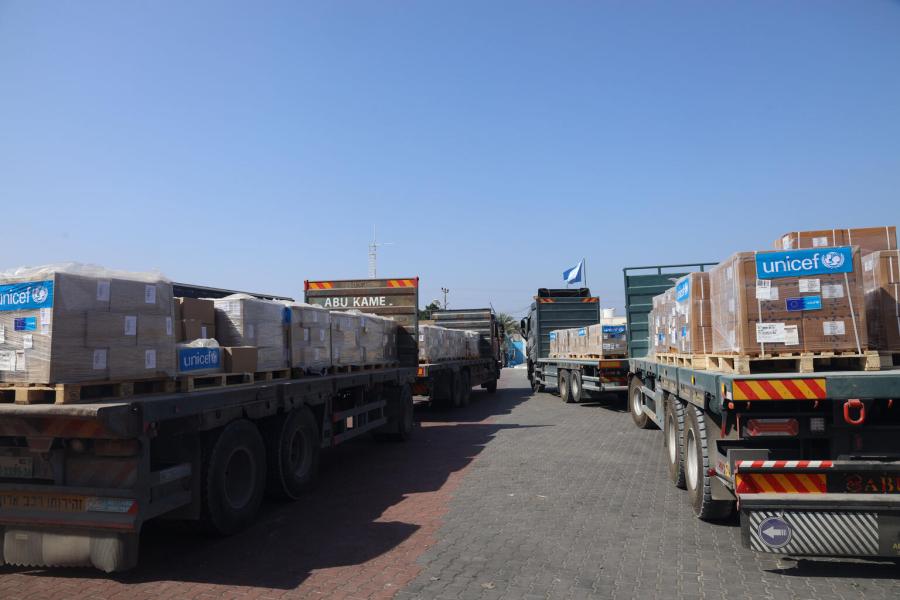
Support to Egypt’s efforts to facilitate urgent medical evacuations
On the meantime, UNICEF is supporting the Government of Egypt to facilitate the evacuation of urgent medical cases from Gaza, allowing them to access critical health services in Egypt safely. More specifically, UNICEF and its partners support the Ministry of Health with medical equipment and supplies. These include 215 oxygenators, 140 syringes and infusion pumps, and 7,500 boxes of surgical sutures. The priority is medical supplies to support the initial humanitarian response for about 12,000 medical cases. Additionally, UNICEF is providing 58 tents of various sizes for use as field hospitals, 10 wheelchairs, and 9 mobile health clinics to support health facilities. Furthermore, 40 healthcare workers have received training on nutrition screening to enhance their capacity to provide comprehensive care to those in need. UNICEF also delivered 20,000 drinking water bottles (600ml each) to address the essential need for clean and safe drinking water in the affected areas.
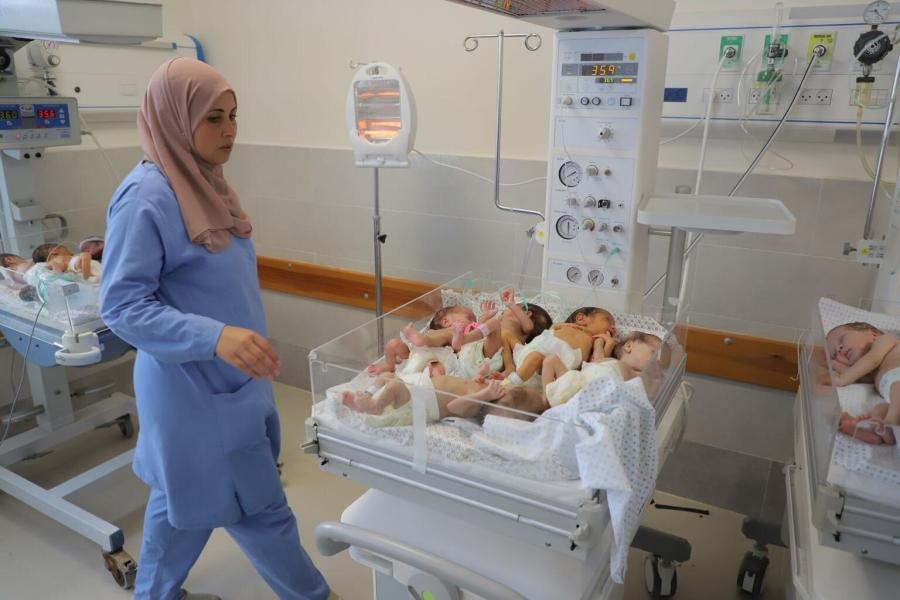
Support for child protection services
Furthermore, UNICEF is supporting the Ministry of Social Solidarity by providing child protection services based on identification and assistance to vulnerable children, including unaccompanied and separated children. UNICEF is doing this by setting up two child-friendly spaces in the hospitals to provide children with a basic package of mental health and psychosocial support, including psychosocial first aid, referral of children in need to specialized child protection services, and distribution of the prepositioned 2,000 hygiene kits – in coordination with the Egyptian Red Crescent Society – and winterization items.
More food supplies, solutions to support humanitarian community amid repeated communications blackouts
The World Food Programme (WFP) has brought in 73 trucks carrying 1,296 metric tons of food supplies that arrived in Gaza through the Rafah crossing border, including canned fish, date bars, and food parcels that have reached over 500,000 people in Gaza.
WFP is deploying staff to El-Arish in support of the Egyptian Red Crescent Society, to deliver much-needed aid into Gaza through Rafah and expanding support to the Palestinian Red Crescent Society.
In addition, WFP has around 674 metric tons (food parcels, date bars, fava beans. biscuits) of food currently available in Egypt, and over 16,000 metric tons of food commodities are being procured from the region to support the Gaza response.
The WFP-led Emergency Telecommunications Cluster is ready to set up communications systems in Gaza so that the humanitarian community can effectively operate despite the repeated communications blackouts. It has sourced telecommunications equipment, focusing on alternative energy solutions that run independently of local operators.
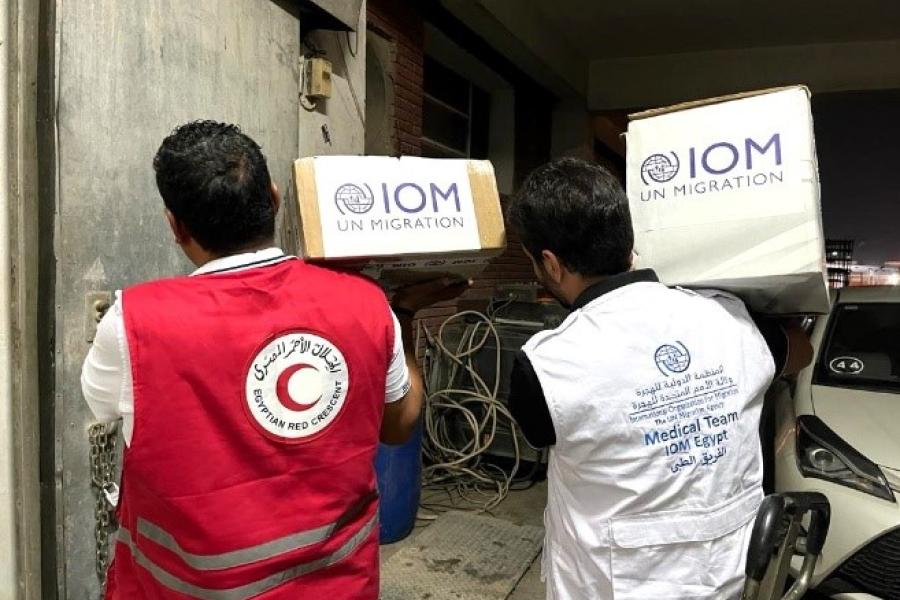
Delivery of assistance desperately needed as winter looms
IOM has successfully delivered the following humanitarian aid to the Egyptian Red Crescent Society which was then moved to Gaza through Rafah:
- 400 bedsheets and covers
- 200 mattresses
- 500 dignity kits
- More than 1,000 hygiene kits
- More than 4,000 medical consumables
- More than 1,900 medicines
- 3000 tarpaulins
IOM Egypt also stands ready to deliver more aid consisting of 30,000 boxes of water, 600 hygiene kits, more than 20,000 shelter Items and more than 4,000 water purifiers as well as 500 family tents.
UNHCR, the UN Refugee Agency, donated 150.5 metric tons of winter clothes and drinking water to meet some of the humanitarian needs in Gaza through the Egyptian Red Crescent Society. The assistance has already reached Gaza through the Rafah crossing.
UNHCR is working closely with the Egyptian Red Crescent Society and the UN in Egypt to deliver more aid soon.
UPDATE
The United Nations Development Programme (UNDP) in Egypt on 21 December, 2023, announced a comprehensive contribution to the Egyptian Red Crescent (ERC) to strengthen their capabilities in responding to the ongoing Gaza War, which includes a financial contribution of approximately EGP 5 million to address ERC’s pressing needs arising from the war.
UNDP Egypt’s support to ERC is strategically directed towards several key areas, aiming to enhance ERC's operational efficiency and overall effectiveness in delivering humanitarian aid. This includes strengthening ERC’s staffing capacities, establishing critical humanitarian service points that act as central hubs for the distribution of essential resources, support, and aid to affected populations and building the capacities of ERC volunteers in emergency response. ERC plays a critical role in supporting access to Gaza through the only crossing point for the passage of aid and commercial supplies from the Egyptian borders.




